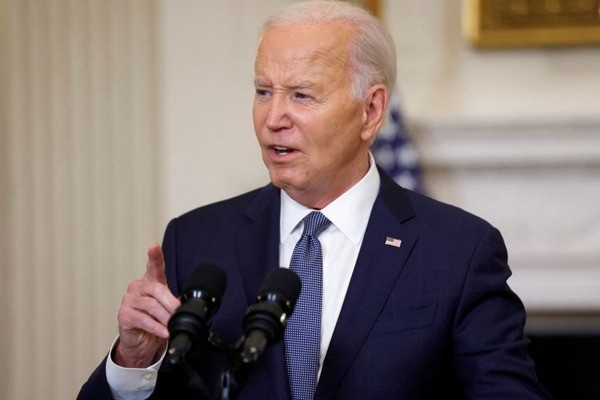Iran’s Plan to Strike Back Against the U.S.
Iran’s Military Preparations Following U.S. Attacks
Loading...

Any Israeli response to Iran’s missile barrage should be ‘proportional’, says the US president.
President Biden's Stance on Iranian Aggression
In a recent statement, United States President Joe Biden firmly opposed any Israeli military strikes on Iran’s nuclear facilities in response to Tehran's missile attacks on Israel. When questioned by reporters on Wednesday, Biden's response was clear: “the answer is no.” This declaration comes in the wake of Iran launching approximately 180 ballistic missiles at Israel, marking the second such attack since April. The missile strikes are seen as retaliation for the assassination of key figures allied with Iran, including Hamas leader Ismail Haniyeh and Hezbollah leader Hassan Nasrallah.
Israeli Response and Regional Tensions
Following the missile barrage, Israeli Prime Minister Benjamin Netanyahu vowed that Iran would “pay” for its actions. Although the missile strikes reportedly did not result in significant casualties in Israel, they did lead to the death of one Palestinian in the occupied West Bank. Analysts have raised concerns that Israel might seize this opportunity to target Iran’s nuclear facilities, a long-standing objective for Israeli leaders. Ali Vaez, the Iran Project director at the International Crisis Group, noted that the risk of an Israeli attack on Iran's nuclear program is particularly high at this moment, given the weakened state of Iran's defensive ally, Hezbollah.
Former Israeli Prime Minister Naftali Bennett echoed this sentiment, calling for immediate action to dismantle Iran’s nuclear capabilities. In a post on social media platform X, Bennett stated, “We have the justification. We have the tools,” emphasizing the urgency of the situation.
Biden Advocates for a Proportional Response
In light of the escalating tensions, President Biden reiterated the United States' unwavering support for Israel. However, he stressed that any Israeli response to Iran's aggression should be “proportional.” This stance aligns with the views of other G7 nations, including Canada, France, Germany, Italy, Japan, and the United Kingdom. Following discussions with allied leaders, Biden also indicated that the U.S. would coordinate efforts to impose new sanctions on Iran.
U.S. officials have warned that Iran will face “severe consequences” for its actions, with State Department spokesman Matthew Miller stating that no options are off the table. This careful balancing act reflects the complexities of U.S. foreign policy in the region, where the potential for conflict remains high.
Broader Implications for the Middle East
The recent escalation between Iran and Israel has raised alarms about the possibility of a wider conflict in the Middle East, particularly as tensions continue to simmer in Gaza and Lebanon. Iranian President Masoud Pezeshkian defended the missile attacks as justified but insisted that Tehran does not seek war with Israel. Meanwhile, Iran's armed forces have issued warnings that any Israeli retaliation would result in “vast destruction.”
Political analysts, such as Al Jazeera’s senior political analyst Marwan Bishara, have expressed concerns that a direct confrontation between Iran and Israel, especially with U.S. involvement, could have catastrophic consequences for the entire region. Bishara cautioned that the repercussions of such a conflict would extend far beyond the immediate participants, potentially engulfing the entire Middle East in turmoil.
As the situation develops, the international community watches closely, aware that the stakes are high and the potential for escalation remains ever-present.
Editor
Iran’s Military Preparations Following U.S. Attacks
Troops remain in five strategic locations, raising fears of renewed tensions and long-term occupation.
Opposition forces have taken control of the capital after a significant offensive. Here is how it unravelled.
